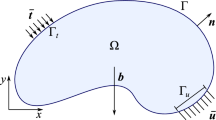Abstract
Adapting an unstructured CFD mesh to the modified geometry, in accordance with the updated value-set of design parameters at the end of each cycle, is a must in CFD–based shape optimization loops. Mesh adaptation is a nice alternative to remeshing procedures which might become expensive and, also, hinder the initialization of new simulations from previous results. Mesh morphing, based on Radial Basis Functions (RBF) network, has been widely used in the past to smoothly propagate boundary nodal displacements into the volume mesh while preserving its validity and quality. To precisely capture even small design changes, all surface mesh nodes must be used as interpolation nodes which, in case of large meshes for real-world application, leads to excessive computational cost and memory requirements. This paper introduces a cost reduction strategy for mesh adaptation, by proposing a new two-step RBF interpolation employing the Sparse Approximate Inverse (SPAI) preconditioner and the Fast Multipole Method (FMM). The software is demonstrated in the aerodynamic shape optimization of a turbomachinery row. The purpose of this paper is not to solve the optimization problem itself; emphasis is laid on the way the proposed method may handle large displacements and, for this reason, Evolutionary Algorithms (EA) which allow great variations in the values of the design variables were first used. Adjoint-based optimization follows; its role is to perform the refinement of the best solution obtained by the EA-based search.
Access this chapter
Tax calculation will be finalised at checkout
Purchases are for personal use only
Similar content being viewed by others
Notes
- 1.
\(||\ldots ||\) is the Euclidean norm.
- 2.
Under certain conditions explained in Buhmann (2009).
- 3.
An integer lattice is tessellation of the \(\mathrm {I\!R}^3\) euclidean space in bricks. It is equivalent to a level of an octree.
References
AboutFlow Project Website: TU Berlin TurboLab Stator Case (2016) http://aboutflow.sems.qmul.ac.uk/events/munich2016/benchmark/testcase3/
Asouti VG, Trompoukis XS, Kampolis IC, Giannakoglou KC (2011) Unsteady CFD computations using vertex-centered finite volumes for unstructured grids on graphics processing units. Int J Numer Methods Fluids 67(2):232–246
Buhmann M (2009) Radial Basis Functions: Theory and Implementations. Cambridge University Press, Cambridge Monographs on Applied and Computational Mathematics
Carpentieri B (2009) Algebraic preconditioners for the fast multipole method in electromagnetic scattering analysis from large structures: trends and problems. Electron J Bound Elem 7(1):
de Boer A, van der Schoot M, Bijl H (2007) Mesh deformation based on Radial Basis Function interpolation. Comput Struct 85(1114):784–795
Demko S, Moss WF, Smith PW (1984) Decay rates for inverses of band matrices. Math Comput 43(168):491–499
Floater MS, Iske A (1996) Multistep scattered data interpolation using compactly supported radial basis functions. J Comput Appl Math 73(1):65–78
Fong W, Darve E (2009) The black-box fast multipole method. J Comput Phys 228(23):8712–8725
Gillebaart T, Blom D, van Zuijlen A, Bijl H (2016) Adaptive radial basis function mesh deformation using data reduction. J Comput Phys 321:997–1025
Hon Y, Schaback R, Zhou X (2003) An adaptive greedy algorithm for solving large RBF collocation problems. Numer Algorithms 32(1):13–25
Kallischko A (2007) Modified sparse approximate inverses (MSPAI) for parallel preconditioning. PhD thesis, Technische Universitat Munchen, Germany
Kedward L, Allen CB, Rendall T (2017) Efficient and exact mesh deformation using multiscale RBF interpolation. J Comput Phys 345:732–751
Lazzaro D, Montefusco LB (2002) Radial basis functions for the multivariate interpolation of large scattered data sets. J Comput Appl Math 140(1):521–536
Narcowich FJ, Schaback R, Ward JD (1999) Multilevel interpolation and approximation. Appl Comput Harmonic Anal 7(3):243–261
Rendall TCS, Allen CB (2010) Parallel efficient mesh motion using radial basis functions with application to multi-bladed rotors. Int J Numer Methods Eng 81(1):89–105
Selim M, Koomullil R (2016) Mesh deformation approaches-a survey. J Phys Math 7(181):2090–2092
The EASY (Evolutionary Algorithms SYstem) software (2008) http://velos0.ltt.mech.ntua.gr/EASY
Tsiakas KT, Gagliardi F, Trompoukis XS, Giannakoglou KC (2016) Shape optimization of turbomachinery rows using a parametric blade modeller and the continuous adjoint method running on GPUs. In: 7th ECCOMAS Conference Proceedings, Crete Island, Greece
Wang Y, Qin N, Zhao N (2015) Delaunay graph and radial basis function for fast quality mesh deformation. J Comput Phys 294:149–172
Wendland H (1995) Piecewise polynomial, positive definite and compactly supported radial functions of minimal degree. Adv Comput Math 4(1):389–396
Acknowledgements
The authors thank Dr. Varvara G. Asouti and Dimitrios H. Kapsoulis for their assistance assistance during the EA-based optimization with the s/w EASY (Evolutionary Algorithm System) (2008) and Dr. S. Xenofon Trompoukis for his assistance with the in-house flow and adjoint solvers (Asouti et al. 2011).
This research was funded from the People Programme (ITN Marie Curie Actions) of the European Union’s H2020 Framework Programme (MSCA-ITN-2014-ETN) under REA Grant Agreement no. 642959 (IODA project). The first author is an IODA Early Stage Researcher.
Author information
Authors and Affiliations
Corresponding author
Editor information
Editors and Affiliations
Rights and permissions
Copyright information
© 2019 Springer International Publishing AG, part of Springer Nature
About this chapter
Cite this chapter
Gagliardi, F., Tsiakas, K.T., Giannakoglou, K. (2019). A Two–Step Mesh Adaptation Tool Based on RBF with Application to Turbomachinery Optimization Loops. In: Andrés-Pérez, E., González, L., Periaux, J., Gauger, N., Quagliarella, D., Giannakoglou, K. (eds) Evolutionary and Deterministic Methods for Design Optimization and Control With Applications to Industrial and Societal Problems. Computational Methods in Applied Sciences, vol 49. Springer, Cham. https://doi.org/10.1007/978-3-319-89890-2_9
Download citation
DOI: https://doi.org/10.1007/978-3-319-89890-2_9
Published:
Publisher Name: Springer, Cham
Print ISBN: 978-3-319-89889-6
Online ISBN: 978-3-319-89890-2
eBook Packages: EngineeringEngineering (R0)




